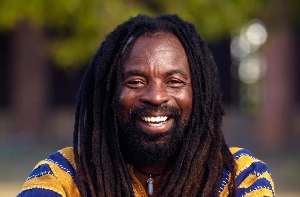Ghana was yesterday admitted into 'La Francophonie', the 53-member French equivalent of the Commonwealth of some English-speaking countries.
Foreign Minister Nana Addo Dankwa Akufo-Addo represented President John Agyekum Kufuor in the group's summit in the Romanian capital, Bucharest.
Started as a small club of Northern French-speaking countries, La Francophonie has since evolved into an important international organisation whose numerous branches cooperate with the organisation's member states in the fields of culture, science, economy, justice, and peace.
Speaking to The Statesman from the 11th Summit of La Francophonie last night, Nana Akufo-Addo said, "This is of significant strategic mutual benefit because of our geographic, historic and even blood ties with Francophone countries. The French have always insisted on a greater strategic integration with us. This is a step forward in that direction. Our lives are intimately linked with the French world, particularly in our sub-region and this strategic association would give a big boost to addressing some of our mutual concerns."
The Foreign Minister, who continued to Europe after the President's attendance of the NAM and General Assembly summits in the Americas, explained that Ghana has been "immediately granted associate membership," without having to go through the usual channel of observer status.
The process of Ghana's full membership of the predominantly French-speaking bloc is expected to begin next week.
While there are obvious economic benefits to be gained from this association, Nana Akufo-Addo preferred to dwell for now more on the wider "strategic relevance" of membership.
He was, however, confident that this enhanced closeness to the Francophone world would not harm Ghana's old membership of the other bloc, Commonwealth.
"The Commonwealth and the La Francophone are not diametrically opposed to each other. We are full members of the Commonwealth and this would not jeopardise that old alliance. Indeed, our Commonwealth friends are fully aware of this process that we have embarked on. The two organisations are not incompatible," he assured.
La Francophone is the community of people and countries using French. Fifty-three states and governments are members of the organisation, four others are associate members, and ten additional states are invited observers of its Summits.
Until Abdou Diouf of Senegal took over as Executive Secretary in 2003, former UN Secretary General Boutros Boutros-Gali held that position for the previous five years.
At yesterday's opening of the summit, French President Jacques Chirac stressed the importance of global peace.
"There is no possible horizon for our world or for la Francophonie without peace," Chirac told delegates.
"The tragedy that has just bloodied Lebanon reminds us of that.
At a time when the world is victim to intense upheaval, la Francophonie is more important than ever."
Also, Canadian Prime Minister Stephen Harper called on members of la Francophonie to play a key role in easing tensions around the world.
Harper said la Francophonie nations must become major players in efforts to promote peace and reconciliation internationally.
"La Francophonie must contribute to easing the tensions and conflicts that affect us," Mr. Harper said Thursday.
In Sudan, where a humanitarian crisis is unfolding in the Darfur region, Mr. Harper urged francophone countries to do all they can to restore security and reduce trafficking in arms.
The next meeting of the summit will take place in 2008 in Quebec City, when the city celebrates its 400th anniversary.
Member states were urged to ratify a UN convention on cultural diversity.
The convention must be signed by at least 30 countries by June 2007 to be adopted by UNESCO and so far only 11 countries have done so. Canada was the first.
Few of the organisation's member states are majority French-speaking aside from France, its overseas possessions and sub-national members. In several other member states French functions as a common language.
Ghana is peculiar as an Anglophone country being surrounded by three Francophone states on all borders. It is often said that even the Gulf of Guinea speaks French.
The modern Francophonie was created in 1970. Its motto is égalité, complémentarité, solidarité (equality, complementarity, and solidarity), harking of France's motto.
Its membership include Belgium, Benin, Burkina Faso, Cameroon, Canada, Egypt, Gabon, Guinea, la Cote d'Ivoire, Lebanon, Luxembourg, Mali, Mauritius, Morocco, St Lucia, Senegal, Switzerland and Togo.
Other members include, Bulgaria, Burundi, Cambodia, Cape Verde, Central Africa Republic, Chad, DR Congo, Republic of Congo, Djibouti, Dominica, Equatorial Guinea, Guinea-Bissau, Laos, Madagascar, Mauritania, Morocco, Madagascar, Martinique, Moldova, Monaco, Niger, Rwanda, Romania, São Tomé and Príncipe, Seychelles, Tunisia, Vanuatu, and Vietnam.
Other associate and additional members include Andorra, Armenia, Austria, Czech Republic, Croatia, Greece, Hungary, Lithuania, Macedonia, Poland, Slovakia and Slovenia.
Romania, the host state, is using the occasion to state its case for becoming an active voice of La Francophonie within the EU.
General News of Friday, 29 September 2006
Source: The Statesman
















